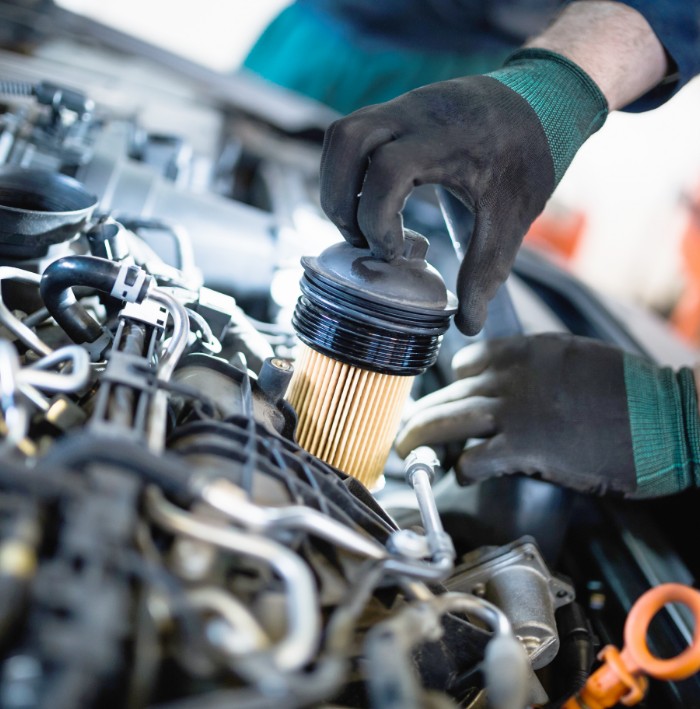What to Expect with an Oil & Filter Change

1. Schedule Your Appointment
Whether scheduling online or over the phone be sure and let us know what you're experiencing so we can provide fast and accurate service advice.
2. Diagnostics and Inspections
Drop off your vehicle and the shop will get to work with inspections and diagnostics using the same equipment as the manufacturers to determine issues and next steps.
3. Digital Vehicle Inspection Report and Estimate
Following the diagnosis we will text you a digital vehicle inspection report, containing pictures and videos of our findings and recommendations.
4. Review and Approval
A service advisor will reach out to walk you through the findings and recommendations to determine how you would like to proceed, or you can approve work directly in your DVI.
5. Work Performed or Scheduled
Most work can be completed immediately, or scheduled based on parts and customer availability.

The World Record Of The Highest Vehicle Mileage Is 3,039,122 miles


Importance of Oil & Filter Changes
The oil filter plays a key role in trapping contaminants and stopping them from circulating in your engine. Changing the oil filter every time you get an oil change keeps your engine clean and running efficiently.
A clean oil filter helps keep the engine healthy by blocking dirt and debris. Over time, a clogged filter can reduce oil flow, causing increased engine wear and the potential for overheating. Replacing your oil filter regularly helps maintain consistent oil pressure and extends your engine's life.
Signs That You Might Need an Oil Change
Recognizing the signs your vehicle needs an oil change helps keep it running smoothly.
Look out for the following indicators:
- Check Engine or Oil Change Light: Appears on your dashboard.
- Dark, Dirty Oil: Fresh oil is amber and clear; dirty oil looks dark and gritty.
- Engine Noise: Excess engine noise or knocking sounds.
- Exhaust Smoke: Too much smoke from the exhaust pipe.
- Oil Smell Inside the Car: A strong oil odor inside the vehicle.
Spotting these signs early helps you avoid costly repairs. Routine inspections let you monitor oil condition, protect engine health, and maintain fuel efficiency. Visit our Lakeland service center regularly to keep your car running smoothly.
How Oil Change Shops in Lakeland Support Local Vehicles
Drivers in Lakeland rely on their vehicles to get around both urban and rural areas, making reliable oil change services crucial. Local shops like Christian Brothers Automotive Lakeland Heights keep pace with advances in vehicle technology and local climate demands.
For example, the Florida Department of Transportation recommends more frequent oil inspections for drivers facing heavy traffic or long trips during peak heat and rainy seasons. Oil change places in Lakeland select parts and oils designed for summer storms, high humidity, and busy streets.
By following manufacturer-approved methods and communicating clearly, Lakeland’s top shops help you meet local driving needs. Choosing a reputable local provider means you get consistent service and a straightforward approach that fits our region.
Frequently Asked Questions
What Type of Oil is Best for My Car?
Choosing the right oil for your vehicle depends on several factors, including the car's age, make, model, and driving conditions. Typically, newer vehicles benefit from synthetic oils due to their superior protective qualities, while older models may perform well with conventional oils. High-mileage vehicles often require oils specifically designed to minimize leaks and consumption. Consulting your vehicle manual or asking our team can help you determine the most suitable oil type for your needs.
Why is an Oil Change Important?
Regular oil changes keep your engine clean and well-lubricated. Oil reduces friction between moving parts, minimizing wear and heat buildup. Over time, oil degrades and loses its effectiveness, increasing the risk of engine wear and damage. Timely oil changes help maintain fuel efficiency, reduce emissions, and support your vehicle's longevity.
How Do I Know When My Car Needs an Oil Change?
Watching for indicators like the oil change light, increased engine noise, and dark or dirty oil can prevent engine damage. Regular checks and following manufacturer recommendations for mileage or timing guide you on when an oil change is due. If you are unsure, our technicians can assess your oil and keep your engine healthy.
What Happens If I Don't Change My Oil?
Skipping oil changes causes sludge to build up and increases friction and wear on engine parts. This leads to overheating and can cause severe engine failure. Sludge can also restrict oil flow, making parts grind and causing faster wear. Keeping your oil fresh is a cost-effective way to maintain performance.
Your Local Christian Brothers Amenities
FAQs
-
Q. "What happens if I wait too long for an oil change?"Your oil helps lubricate and absorb heat within your engine. If you wait too long to get an oil change, your engine will eventually have severe and costly issues. Luckily oil changes are relatively inexpensive and have a quick service time. Click here to learn more about the consequences of not replacing your vehicle's oil.
-
Q. "What type of oil should I get for my vehicle?"This depends on what vehicle you drive. Each type has its own benefits such as life expectancy or price. If you are unsure what type of oil is right for your car, we can help you determine the best option for you.
-
Q. "How much oil does my vehicle require?"Most vehicles hold between 5 and 8 quarts, but it largely depends on the size of your engine.
-
Q. "What is a Digital Vehicle Inspection?"With a complimentary Digital Vehicle Inspection (DVI) on every visit, you’ll see firsthand photos of your vehicle from under the hood. We’ll let you know if everything is functioning properly or if there are any areas of concern. You can even approve or deny our service recommendations, all straight from your smartphone, or you can, of course, give us a call and we’ll explain our findings in further detail.
-
Q. "Do you offer a warranty?"As part of our Nice difference.® commitment to providing our customers the best auto service experience possible, we also offer a 3-year/36,000-mile warranty on all the work that we do. We offer this warranty at every Christian Brothers Automotive nationwide, and it will be honored at any location, regardless of which branch did the initial work.
-
Q. "Can you provide service under my extended warranty?"Yes. At Christian Brothers Automotive, we work with all major extended warranty providers to make needed repairs for our customers. If you have an extended warranty, you can discuss your carrier with our team when scheduling an appointment and confirm that the work will be covered. You can find a partial list of the extended warranty companies we work with here.
Have more Questions?
Our friendly auto service experts have the answers.
Call your local Christian Brothers Automotive car shop today
Hear What Our Customers Had to Say About Us
-
"You have no idea how much I enjoy the level of service I receive when I visit your establishment. Thanks for everything!"
- Willie M Mosley Sr
